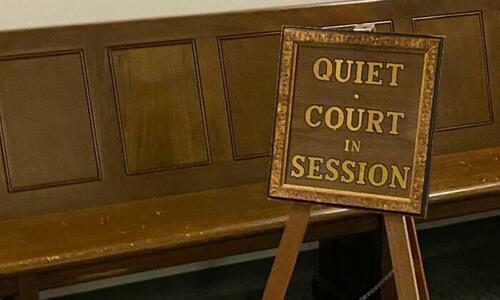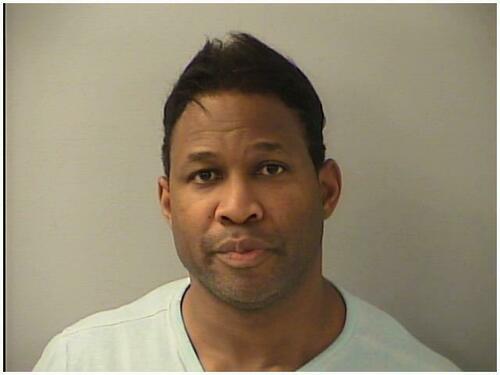Man Claiming To Be Prince Of Ghana Standing Trial Over $800,000 Fraud Scheme
Authored by Janice Hisle via The Epoch Times (emphasis ours),
The man known as “Daryl Attipoe” displayed all the apparent hallmarks of success, power, and wealth. He wore nice clothes, exuded charisma, and drove two high-end cars: a sporty red Dodge Viper and a sleek black Mercedes-Benz.

He boasted of exotic business ventures, such as mining for chrome and diamonds. He asserted that he was a member of the royal family in the West African nation of Ghana.
In addition, authorities said he became a “cult-like” spiritual leader—one who inspired women to bow at his feet and to follow his ministry cross-country, from Ohio to Colorado.
But he was nothing but a fraudster, prosecutors say.
Paper and money trails led investigators to the true identity of “Prince Daryl Attipoe,” also known as “Prophet Daryl Attipoe:” Daryl Robert Harrison. He is a convicted felon who, according to authorities, had “no identifiable legitimate income” and acted as a classic “conman” in a bizarre investment scheme.
The 44-year-old is standing trial in U.S. District Court, Dayton, Ohio, for allegedly bilking a dozen people out of more than $800,000. The investors were young and old and came from varied professions, including dentistry, accounting, and personal training.
Harrison “fraudulently diverted” the investors’ money for his personal use, court records say.
He and his stepfather used the funds to buy luxury vehicles, airplane tickets, hotel accommodations, trips to Africa, rental cars, and monthly rent payments exceeding $3,000 for Daryl Harrison’s 5,100-square-foot home in Parker, Colo., officials said. He, his wife, and six children lived there.
But the younger Harrison’s lawyer, Christopher Deal, told jurors: “These investments are legit.”
A series of “unforeseen setbacks,” including the coronavirus pandemic, prevented Harrison from making good on his business promises, Deal said, adding that his client can rightfully call himself “prince” because a royal Ghanian family befriended and then “adopted” him.
‘Borderline Buffoonish’ Contracts
Harrison, who was indicted almost two years ago, is standing trial on 16 charges: conspiracy to engage in mail fraud and wire fraud, three counts of mail fraud, nine counts of wire fraud, and three counts of witness tampering. Harrison’s stepfather, Robert S. Harrison Jr., faces just one conspiracy count; his trial is set for Dec. 5 before Judge Michael J. Newman, the same judge who is presiding over the younger Harrison’s trial.
As Harrison’s trial launched Sept. 6, assistant U.S. Attorney Dwight Keller told jurors that he intended to present testimony from 17 witnesses, including 12 people who say he financially victimized them.
Harrison swooped in on them at supermarkets, fitness centers, religious gatherings, and “even a car wash,” Keller said.
He targeted people who were “vulnerable” in some way—inexperienced, greedy, or “flat-out gullible,” Keller said. “Through fast talking and slick salesmanship, they were hoodwinked into investing with him.”
Numerous documents and 23 so-called “contracts,” mostly written in Harrison’s own handwriting, support the allegations, Keller said. The contracts were written in a manner that was unsophisticated, “sophomoric” and “borderline buffoonish,” Keller said.
Harrison promised investors that they could expect outrageously high rates of return, ranging from 28 percent to 33 percent a year, Keller said. Harrison also assured that the investors’ money would remain safe, secure, and accessible to them.
But when investors asked questions, demanded account statements, or sought refunds, Harrison typically made himself scarce, Keller said.
The alleged illegal activities date to 2014, after Harrison’s stepfather registered two businesses in Ohio: the nonprofit Power House of Prayer Ministries and a for-profit corporation called New Max Groups. From 2015-2020, Daryl Harrison solicited investors for New Max, sometimes instructing them to make checks payable to the ministry, court records say.

One such investor was Peggy Braun, 58. Braun, who wears eyeglasses and has short salt-and-pepper hair, walked slowly to the witness stand, where she spent hours testifying on Sept. 6–7. Braun described her dealings with Harrison, whom she knew as “Daryl Attipoe.”
Braun met Harrison in late 2015 or early 2016 because he repeatedly came through her cashier’s checkout lane at the Kroger grocery store in Maineville, Ohio. “He would follow me around,” she said. The two would occasionally chat; they learned a few things about each other’s lives.
Braun said she is driven to help children. She never became a mother, but she raised a relative’s two children as her own and started college funds for them. She also has made monetary contributions to the March of Dimes and St. Jude Children’s Research Hospital.
Life Savings Mostly Gone
The man she now knows as Harrison urged her: “Invest with me. I’ll make you lots of money.” She dreamed of increasing her contributions to the children’s college funds and charities even more.
Braun said she believed that Harrison indeed was a prince because of the way he behaved, the fancy cars he drove, and the things he told her about lucrative investment opportunities.
“At first, I was leery about it,” Braun said. But Harrison seemed to have a way to counter all of her concerns. “I said, ‘This better not be fraud.’” His response, she says: “Don’t be silly. This is not fraud.”
According to Braun’s testimony, she initially offered to invest $50,000—an amount that made Harrison scoff. He needed $400,000 from her, she said.
After persuading Braun to sign an agreement committing to that amount, Harrison issued a “certificate of ownership,” with a fancy border and handwritten entries listing Braun’s name, dated Nov. 7, 2017, and “K4 Roland Shaft,” purportedly referring to a chrome mine location.
Another document sets the value of the mine at $650 million. That investment was supposed to start generating $25,000 a month for Braun; Harrison promised she would be repaid her $400,000 within two years, she said.
“I thought he was a prince. Otherwise, I would not have done this,” she said. Braun said it felt “surreal” that “a prince came to me, trying to help me out.”
Besides working at Kroger, Braun also worked in an office job for a local factory that went out of business last year; she held both jobs for 21 years. Braun worked hard for all the money and assets she accrued during that time.
After she and Harrison became acquainted, they would meet at a Chinese restaurant near the Kroger store; Braun would come there after finishing her first job for the day, as she prepared to report for duty at Kroger.
At the restaurant, Harrison would have Braun sign various agreements. They would discuss business deals, including the chrome mine, a diamond mine, and real estate investments. Harrison also repeatedly called and texted Braun to persuade her to contribute more money.
Royally Cheated
At one point in 2019, Harrison got Braun to sign a contract for $100,000 for a diamond mine, which was supposed to generate $10,000 a month for her. On that paper, Braun said she crossed out wording that would have given Harrison the power to manage her remaining stocks and assets.
“He wanted everything that I had,” she said, including the college funds she had set aside for her young relatives. “He wanted the deed on my house; he wanted everything.”
Even though her suspicions were growing as time passed and cash wasn’t flowing her way, Braun ended up giving Harrison a total of $553,500.
“I gave him most of my life savings because I thought I was going to make beaucoup money … and I wanted to help kids,” Braun testified, her voice cracking. “Kids are my life.”
Braun had liquidated her Kroger stock, cashed in accounts she held with a nationally recognized investment firm, and took funds out of her 401-K retirement account. Harrison promised to pay extra taxes she incurred; that didn’t happen as agreed, Braun said.
“He got the benefit. I got nothin,’” she said. She got $27,000 back from Harrison.
Braun said she felt misled, cheated and defrauded. During 2020, she needed help paying taxes, and tried to get back some of her funds for that purpose. Harrison sent her two money orders, one for $1,000; the other for $2,000.
But he complained to her about the cost of overnight delivery. “You’re a billionaire, millionaire, whatever you want to say, and you’re complaining about a UPS charge?” she said.
During Braun’s testimony, prosecutors played recorded telephone conversations from May 2020. Harrison can be heard discouraging Braun from contacting a U.S. Secret Service agent who had left a business card at her home.
Read more here...
https://ift.tt/b3LK7eo
from ZeroHedge News https://ift.tt/b3LK7eo
via IFTTT





0 comments
Post a Comment